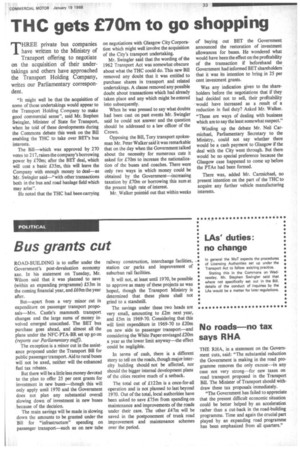THC gets £70m to go shopping
Page 35

If you've noticed an error in this article please click here to report it so we can fix it.
THREE private bus companies have written to the Ministry of Transport offering to negotiate on the acquisition of their undertakings and others have approached the Transport Holding Company, writes our Parliamentary correspondent.
"It might well be that the acquisition of some of those undertakings would appear to the Transport Holding Company to make good commercial sense", said Mr. Stephen Swingler, Minister of State for Transport, when he told of these developments during the Commons debate this week on the Bill enabling the THC to take over BET's bus interests.
The Bill—which was approved by 270 votes to 217, raises the company's borrowing power by £70m; after the BET deal, which will cost a basic £35m, this will leave the Company with enough money to deal—as Mr. Swingler said—"with other transactions both in the bus and road haulage field which may arise".
He noted that the THC had been carrying on negotiations with Glasgow City Corporation which might well involve the acquisition of the City's transport undertaking.
Mr. Swingler said that the wording of the 1962 Transport Act was somewhat obscure about what the THC could do. This new Bill removed any doubt that it was entitled to purchase shares in transport and related undertakings. A clause removed any possible doubt about transactions which had already taken place and any which might be entered into subsequently.
When he was pressed to say what doubts had been cast on past events Mr. Swingler said he could not answer and the question should be addressed to a law officer of the Crown.
Opposing the Bill, Tory transport spokesman Mr. Peter Walker said it was remarkable that on the day when the Government talked about the necessity for numerous cuts it asked for £70ni to increase the nationalization of the buses and coaches. There were only two ways in which money could be obtained by the Government—increasing taxation by £70m or borrowing this sum at the present high rate of interest.
Mr. Walker pointed out that within weeks of buying out BET the Government announced the restoration of investment allowances for buses. He wondered what would have been the effect on the profitability of the transaction if beforehand the Government had informed BET shareholders that it was its intention to bring in 25 per cent investment grants.
Was any indication given to the shareholders before the negotiations that if they had decided not to sell, their profitability would have increased as a result of a reduction in fuel duty? Asked Mr. Walker.
"These are ways of dealing with business which are to say the least somewhat suspect."
Winding up the debate Mr. Neil Carmichael, Parliamentary Secretary to the Ministry, could not say whether there would be a cash payment to Glasgow if the deal with the City went through. But there would be no special preference because the Glasgow case happened to come up before the PTAs had been formed.
There was, added Mr. Carmichael, no present intention on the part of the THC to acquire any further vehicle manufacturing interests.




















































































































